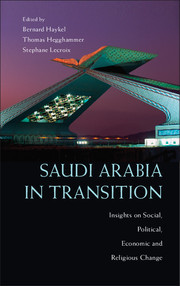Description
Saudi Arabia in Transition
Insights on Social, Political, Economic and Religious Change
Coordinators: Haykel Bernard, Hegghammer Thomas, Lacroix Stéphane
This book presents new insights and the most up-to-date research on Saudi Arabia's social, cultural, economic and political dynamics.
Language: English
Subject for Saudi Arabia in Transition:
Saudi Arabia in Transition
Publication date: 01-2015
357 p. · 15.2x22.9 cm · Paperback
Publication date: 01-2015
357 p. · 15.2x22.9 cm · Paperback
Saudi Arabia in Transition
Publication date: 01-2015
360 p. · 15.2x22.9 cm · Hardback
Publication date: 01-2015
360 p. · 15.2x22.9 cm · Hardback
Description
/li>Contents
/li>Biography
/li>
Making sense of Saudi Arabia is crucially important today. The kingdom's western province contains the heart of Islam, and it is the United States' closest Arab ally and the largest producer of oil in the world. However, the country is undergoing rapid change: its aged leadership is ceding power to a new generation, and its society, dominated by young people, is restive. Saudi Arabia has long remained closed to foreign scholars, with a select few academics allowed into the kingdom over the past decade. This book presents the fruits of their research as well as those of the most prominent Saudi academics in the field. This volume focuses on different sectors of Saudi society and examines how the changes of the past few decades have affected each. It reflects new insights and provides the most up-to-date research on the country's social, cultural, economic and political dynamics.
1. Introduction Bernard Haykel, Thomas Hegghammer and Stéphane Lacroix; Part I. Politics: 2. Rentier exceptionalism: oil and political mobilization in Saudi Arabia Gregory Gause; 3. The dogma of development: technopolitics and power in Saudi Arabia Toby Jones; 4. Enforcing the state's Islam: the functioning of the committee of senior scholars Nabil Mouline; Part II. Oil: 5. Saudi Arabia and the world oil market Giacomo Luciani; 6. The political economy of regional development in post-World War II Saudi Arabia Steffen Hertog; 7. Oil in Saudi Arabian culture and politics: from tribal poets to Al-Qaeda's ideologues Bernard Haykel; Part III. Islam and Islamism: 8. From Wahhabi to Salafi David Commins; 9. Understanding stability and dissent in the kingdom: the role of the jama'at in Saudi politics Stéphane Lacroix; 10. The struggle for authority: the Shaykhs of Jihadi-Salafism in Saudi Arabia, 1997–2003 Saud al-Sarhan; 11. 'Classical' and 'global' jihadism in Saudi Arabia Thomas Hegghammer; Part IV. Social Change: 12. Raiders and traders: a poet's lament of the end of the Bedouin heroic age Abd al-Aziz H. Al Fahad; 13. Rootless trees: genealogical politics in Saudi Arabia Abd al-Aziz H. Al Fahad; 14. Caught between religion and state: women in Saudi Arabia Madawi al-Rasheed; 15. Engendering Saudi consumerism: a study of young women's practices in Riyadh's shopping malls Amélie Le Renard.
Bernard Haykel is a Professor of Near Eastern Studies at Princeton University, where he teaches and researches the history and politics of Islam and the Arabian Peninsula. He has published Revival and Reform in Islam (2003) and various articles on Islamic law, Salafism and al-Qaeda, among other subjects. Professor Haykel currently directs Princeton's Institute for the Transregional Study of the Contemporary Middle East as well as its Oil, Energy and the Middle East Project. He has received numerous prizes, including a Carnegie Corporation Fellowship and a Guggenheim Fellowship. He appears frequently in print and broadcast media, including PBS, Al-Jazeera, BBC, NPR, and The New York Times.
Thomas Hegghammer is a senior research fellow at the Norwegian Defence Research Establishment in Oslo. He has held fellowships at the Institute for Advanced Study at Princeton and at Harvard, Princeton, New York and Stanford universities. His book Jihad in Saudi Arabia (2010) won the silver medal of the Arthur Ross Book Award from the Council of Foreign Relations. He also co-authored Al-Qaida in its Own Words (2008) and The Meccan Rebellion (2011). His many articles, reports and op-eds have appeared in journals and newspapers such as the American Political Science Review, International Security, the International Journal of Middle East Studies, the Times Literary Supplement and The New York Times.
Stéphane Lacroix is an Associate Professor of Political Science at Sciences Po, Paris and a research fellow at the Centre d'Études et de Recherches Internationales. Since 2010, he has also been an associate researcher at the Centre d'Études et de Documentation Economiques, Juridiques et Sociales, in Cairo. He is the author of Awakening Islam: The Politics of Religious Dissent in Contemporary Saudi Arabia (2011), named book of the year in 2011 on Foreign Policy's Middle East Channel. He also co-authored Al-Qaida in its Own Words (2008) and The Meccan Rebellion (2011). His articles h
Thomas Hegghammer is a senior research fellow at the Norwegian Defence Research Establishment in Oslo. He has held fellowships at the Institute for Advanced Study at Princeton and at Harvard, Princeton, New York and Stanford universities. His book Jihad in Saudi Arabia (2010) won the silver medal of the Arthur Ross Book Award from the Council of Foreign Relations. He also co-authored Al-Qaida in its Own Words (2008) and The Meccan Rebellion (2011). His many articles, reports and op-eds have appeared in journals and newspapers such as the American Political Science Review, International Security, the International Journal of Middle East Studies, the Times Literary Supplement and The New York Times.
Stéphane Lacroix is an Associate Professor of Political Science at Sciences Po, Paris and a research fellow at the Centre d'Études et de Recherches Internationales. Since 2010, he has also been an associate researcher at the Centre d'Études et de Documentation Economiques, Juridiques et Sociales, in Cairo. He is the author of Awakening Islam: The Politics of Religious Dissent in Contemporary Saudi Arabia (2011), named book of the year in 2011 on Foreign Policy's Middle East Channel. He also co-authored Al-Qaida in its Own Words (2008) and The Meccan Rebellion (2011). His articles h
© 2024 LAVOISIER S.A.S.




